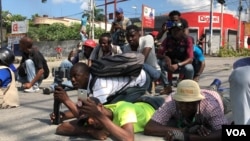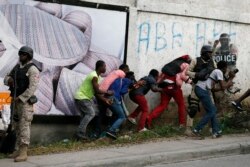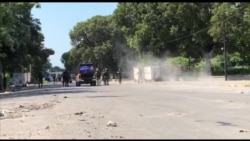The United Nations human rights office expressed concern Friday about violence targeting journalists in Haiti. A U.N. report confirmed at least 42 deaths and 86 injuries during anti-government protests that have roiled the nation for months.
"Reports indicate that security forces were responsible for 19 of the deaths while the rest were killed by armed individuals or unknown perpetrators," U.N. spokesman Farhan Haq told reporters.
According to the U.N., one journalist was killed and nine others injured while doing their job.
In October, a VOA reporter in Port-au-Prince said her wrist was twisted by a National Police officer in an attempt to prevent her from recording mobile video of an altercation between two officers during a protest.
Amnesty International also expressed concern this week about violence and human rights abuses in the Caribbean nation.
"The images that we have verified shed light on human rights violations by the Haitian authorities. The security forces under the command of President Jovenel Moise have used excessive force. Such incidents must be investigated promptly, thoroughly and effectively," Amnesty International Americas Director Erika Guevara-Rosas said.
Frustration has mounted in Haiti over the president's inability to turn the economy around and end corruption. There has been no immediate response from his government about the situation involving the journalists.
The rights group called on President Moise to "take urgent measures to ensure people protesting against his government can do so safely, without putting their lives at risk." Amnesty called on the police to stop using live ammunition against protesters and to "take particular measures to guarantee the safety of journalists covering the political and human rights situation in Haiti.”
Demonstrators and opposition lawmakers said police were using live ammunition rather than rubber bullets against protesters. The National Police Force denied the accusation.
On Thursday however, law enforcement officers of the National Palace Guard fired on protesters who refused to remove makeshift barricades they placed in the street to block an entrance to the National Palace. Journalists covering the event had to lay on the ground to avoid being hit, and in a mobile video recorded by VOA's Creole service, a bullet casing can be seen rolling across the asphalt and landing next to a journalist on the ground.
"We urge all actors to refrain from targeting journalists and respect the freedom of the media to report on the situation," a U.N. statement said.
It also welcomed a "thorough, transparent and independent" investigation into human rights violations by the National Police and "accountability, justice and truth for victims and their families – including through judicial action."
Haiti’s National Police force has also been plagued by allegations of corruption. National Police officials say the force that exists today is a work in progress and far more professional, but that problems persist.
Margaret Besheer at the United Nations and Matiado Vilme in Port-au-Prince contributed to this report








